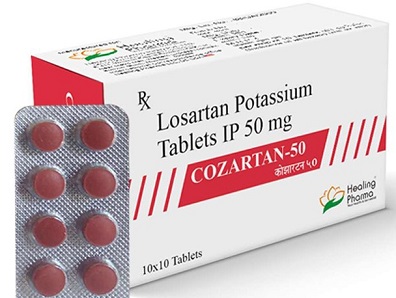Nikhil Prasad Fact checked by:Thailand Medical News Team Jun 30, 2024 1 year, 7 months, 5 days, 15 hours, 41 minutes ago
Cancer News: In a groundbreaking study conducted at the University of Missouri School of Medicine-USA, researchers have identified a potential dual benefit of using a common blood pressure medication to enhance leukemia treatment while protecting the heart from chemotherapy-induced damage. This discovery covered in this
Cancer News report, could significantly improve outcomes for patients battling acute myeloid leukemia (AML), a challenging form of blood cancer.
 Losartan Prevents Cardiotoxicity During Chemotherapy For Leukemia
Understanding AML and Its Challenges
Losartan Prevents Cardiotoxicity During Chemotherapy For Leukemia
Understanding AML and Its Challenges
Acute myeloid leukemia is a type of cancer that affects the bone marrow and blood. It is characterized by the rapid growth of abnormal white blood cells, which can impair normal blood cell production and lead to severe complications. The standard treatment for AML involves intensive chemotherapy, aimed at destroying cancerous cells. However, this treatment can also harm healthy cells, particularly those in the heart, causing cardiotoxicity and potentially limiting treatment options for patients.
The Role of AGTR1 in Leukemia and Heart Health
Led by Associate Professor Dr Xunlei Kang and his team, the study focused on AGTR1, a receptor involved in regulating cell reproduction. The researchers observed that AGTR1 was overexpressed in the blood cells of leukemia patients, suggesting a potential link between leukemia progression and cardiovascular disease. This finding prompted them to investigate whether targeting AGTR1 could not only slow leukemia growth but also protect the heart from chemotherapy-related damage.
Study Findings and Methodology
To explore this hypothesis, Dr Kang, along with Ph.D. students Yi Pan and Chen Wang, conducted experiments using mouse models of leukemia. They administered losartan, a widely used blood pressure medication known to inhibit AGTR1, to these mice. The results were promising: losartan significantly inhibited leukemia progression and improved survival rates in the mice. Moreover, it mitigated the cardiotoxic effects of chemotherapy, preserving the heart's function.
Potential Impact on Human Treatment
While the findings from mouse models are encouraging, Dr Kang emphasized the need for further research to validate these results in human clinical trials. The advantage of using losartan lies in its existing FDA approval for treating hypertension, which could potentially expedite its approval process for leukemia therapy. This repurposing of a well-established medication highlights the potential for faster translation from lab discovery to clinical application.
Insights into Mechanisms and Future Directions
The study also delved into the underlying molecular mechanisms through which AGTR1 inhibition affects leukemia cells and cardiomyocytes. It was discovered that AGTR1 inhibition altered gene expression patterns, particularly those involved in leukemia cell stemness and chemotherapy resistance. The interaction between AGTR
1 and the Notch1 signaling pathway played a crucial role in regulating these cellular processes, providing insights into potential new therapeutic strategies for AML treatment.
Future Prospects
Looking ahead, the next steps involve translating these preclinical findings into human clinical trials to confirm the efficacy and safety of using losartan in leukemia treatment. If successful, this approach could offer a paradigm shift in how AML is managed, providing patients with safer and more effective therapeutic options. The ongoing exploration of AGTR1 as a therapeutic target not only opens doors for new drug developments but also highlights the transformative potential of leveraging existing medications for novel medical applications.
Impact on Patient Care
The potential dual benefit of using losartan in AML treatment - enhancing chemotherapy efficacy while safeguarding heart health - holds promise for improving the quality of life and long-term outcomes for leukemia patients. By minimizing cardiotoxicity, physicians may have more flexibility in administering chemotherapy regimens, potentially leading to better treatment adherence and patient survival rates.
Conclusion
In conclusion, the research by Dr Kang and his team represents a significant advancement in personalized medicine approaches for leukemia treatment. By repurposing losartan to simultaneously enhance chemotherapy effectiveness and protect the heart, they have demonstrated the potential to improve outcomes for AML patients. these findings underscore the importance of interdisciplinary research and innovative approaches in addressing complex medical challenges.
The study's findings provide hope for a more targeted and less toxic approach to treating AML, benefiting patients globally. As research progresses and clinical trials unfold, the medical community eagerly anticipates further advancements in leveraging AGTR1 inhibition to transform leukemia treatment strategies. This collaborative effort between basic science and clinical application exemplifies the potential of medical research to revolutionize patient care and outcomes in oncology.
The study findings were published in the peer reviewed journal: Science Translational Medicine.
https://www.science.org/doi/10.1126/scitranslmed.adl5931
For the latest
Cancer News, keep on logging to Thailand Medical News.
Read Also:
https://www.thailandmedical.news/news/new-u-s-fda-approval-expands-use-of-amgen-s-blincyto-for-leukemia
https://www.thailandmedical.news/news/covid-19-news-while-lymphopenia-is-common-in-sars-cov-2-infections,-some-may-suffer-from-b-cell-lymphocytosis,-that-leads-to-lymphocytic-leukemia
https://www.thailandmedical.news/news/covid-19-news-can-sars-cov-2-cause-reactivation-of-the-latent-sexually-transmitted-htlv-1-virus-that-causes-t-cell-leukemia-lymphoma-atl
